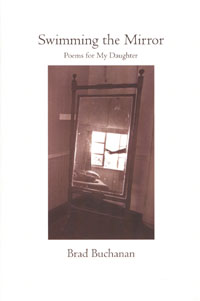|
Swimming the MirrorBrad BuchananReview by Alyce Wilson Most poems involving children are hopelessly sentimental, but Brad Buchanan's poems depict the full range of parental experience: from hope and pride to fear and frustration. He does it all through vivid imagery, as in these lines from "The Feral Child": "The womb has produced these faint traces of wolf: / dark hair on the tailbone, and fuzz on her elfin, / elephant's ears." Unlike other baby albums, this one begins with the moment of conception. In "Baby Dance," he gives us a couple on their first anniversary, falling into the dance "their bodies want to make", where the wife senses "the father / behind the mindless displays of ardor." Even at this stage, though, he acknowledges the conflicting realities of parenthood, as in these closing lines: "At last, their movements make sense; they are gathered, / tense, on the brink of pleasure, the future / wriggling free from them both, and forever." In the next section, he chronicles the infant baby's first awkward moments, such as in "The Drunken Infant," where he describes her as drunk with milk: "she can't be propped upright / for long — she nods / and sways in a bibulous / haze". He admires at her persistence, despite obstacles, to explore her new world. For example, in "A Lesson," where recovered from a virus, she plays with gusto. "She learns to keep // the time that slips past me, by living in / the momentary discoveries / she makes and forgets." In sections three and four, as she blossoms into a toddler, capable of independent movement and language, her progress makes him reflective on the nature of life and parenting. These lines from "Her Song of Hunger" might say it best, as he reminds himself that her screams, while "high-pitched, intolerable" are necessary.
Over and over again, he marvels at the miracle of creating an independent being who, though owing her existence to him, is thoroughly independent. He concludes his collection with these lines in "The Black and White Garden": "For her, the snow / becomes undergrowth, blank space creeps into speech / and a poem is written with places to touch / built into the gently breathed-upon panes / of a lost, glaring wonder. We stare at her mind." Through his words, Buchanan captures his daughter's first days with an intimacy not possible in photographs. Rating: **** (Must Read) Roan Press, 2008: ISBN: 0-9815968-0-0 |
